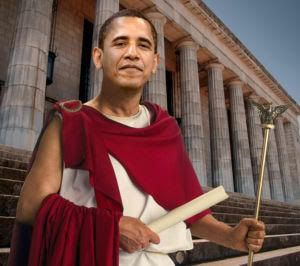(11 am. – promoted by ek hornbeck)

Neither the weary, disciplined […] soldiers, ranked along the west bank, nor the anxious, helter-skelter tribes amassing on the east bank could have been giving much thought to their place in history. But this moment of slack, this relative calm before the pandemonium to follow, gives us the chance to study the actors on both sides of this river and to look backward on what has been and forward to what will be.
…
[I]ts foundations were unassailable, sturdily sunk in a storied past and steadily built on for eleven centuries and more. There was, of course, the prophecy. Someone, usually someone in his cups, could always be counted on to bring up that old saw: the Prophecy of the Twelve Eagles, each eagle representing a century, leaving us with- stubby fingers counting out the decades in a puddle of wine- only seventy years remaining! Give or take a decade! Predictable laughter at the silliness of the whole idea. But in seventy years exactly, the empire would be gone.
[it] hardly foresaw its doom.
…
There are, no doubt, lessons here for the contemporary reader. The changing character of the native population, brought about through unremarked pressures on porous borders; the creation of an increasingly unwieldy and rigid bureaucracy, whose own survival becomes its overriding goal; the despising of the military and the avoidance of its service by established families, while its offices present unprecedented opportunity for marginal men to whom its ranks had once been closed; the lip service paid to values long dead; the pretense that we still are what we once were; the increasing concentrations of the populace into richer and poorer by way of a corrupt tax system, and the desperation that inevitably follows; the aggrandizement of executive power at the expense of the legislature; ineffectual legislation promulgated with great show; the moral vocation of the man at the top to maintain order at all costs, while growing blind to the cruel dilemmas of ordinary life– these are all themes with which our world is familiar, nor are they the God-given property of any party or political point of view, even though we often act as if they were. At least, the emperor could not heap his economic burdens on posterity by creating long-term public debt, for floating capital had not yet been conceptualized. The only kinds of wealth worth speaking of were the fruits of the earth.
Though it is easy for us to perceive the wild instability of the Roman Imperium in its final days, it was not easy for the Romans. Rome, the Eternal City, had been untouchable since the Celts of Gaul had sacked it by surprise in 390 B.C. In the ensuing eight centuries Rome built itself into the world’s only superpower, unassailable save for the occasional war on a distant border.
[…]
They woke to find Alaric, king of the Visigoths, and all his forces parked at their gates. He might as well have been the king of the Fuzzy-Wuzzies, or any other of the inconsequential outlanders that civilized people have looked down their noses at throughout history. It was preposterous.
They dispatched a pair of envoys to conduct the tiresome negotiation and send him away. The envoys began with empty threats: any attack on Rome was doomed, for it would be met by invincible strength and innumerable ranks of warriors.
Alaric was a sharp man, and in his rough fashion a just one. He also had a sense of humor.
“The thicker the grass, the more easily scythed,” he replied evenly.
The envoys quickly recognized that their man was no fool. All right, then, what was the price of his departure? Alaric told them: his men would sweep through the city, taking all gold, all silver, and everything of value that could be moved. They would also round up and cart off every barbarian slave.
But, protested the hysterical envoys, what will that leave us?
Alaric paused. “Your lives.”
In that pause, Roman security died and a new world was conceived.

12 comments
Skip to comment form
Author
When the music’s over
Turn out the lights
…
Cancel my subscription to the Resurrection
Send my credentials to the House of Detention
I got some friends inside…
–Jim Morrison
… have been any worse for the ordinary Roman or colonial subject in this hypothetical:
This seems like a piece of the debt hysteria that is being used as a pretext to strip people of their Social Security benefits.